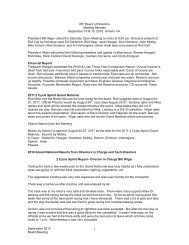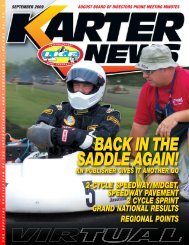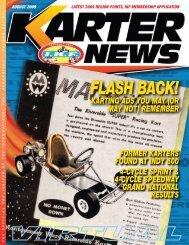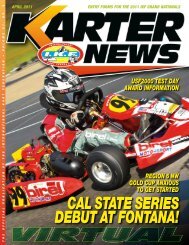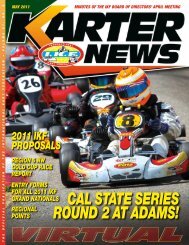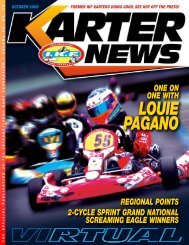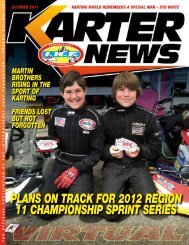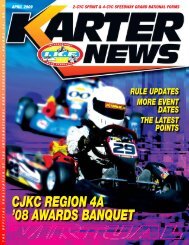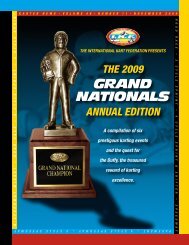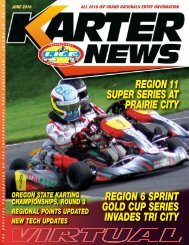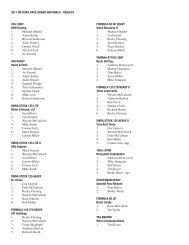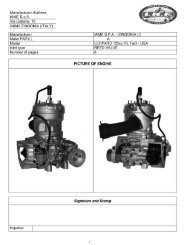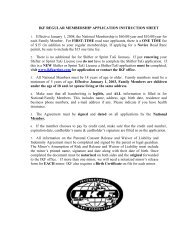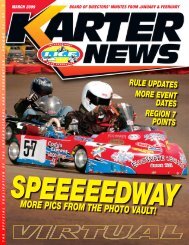April 2010 - International Kart Federation
April 2010 - International Kart Federation
April 2010 - International Kart Federation
- No tags were found...
Create successful ePaper yourself
Turn your PDF publications into a flip-book with our unique Google optimized e-Paper software.
Best in the WestNorthern California <strong>Kart</strong>ers (NCK forshort) is looking ahead to its 2nd pointsrace of the season that will take placeat famed Thunderhill Raceway Park inWillows, CA on May 1, <strong>2010</strong>. NCK is thewest coast’s premier road race club thathas, despite tough economic times, puttogether an impressive racing schedulethat includes visits to 3 different facilitiesduring the <strong>2010</strong> race season. Theyare also the hosting club for this year’sIKF Road Race Grand Nationals.Round 1 was held under sunny andblue skies at Infineon Raceway in February.If you’ve ever wanted to run at thefamed Sonoma, CA course, don’t fret.NCK brings its tent back to Infineon fortheir expanded 2-day event the WesternStates Road Race Classic November 26thand 27th.Road Racing has declined in popularityin recent years largely due to the everincreasing costs of track rental. Unlikesprint racing where clubs typically ownthe track that events are held on, roadrace clubs must rent the track for eachevent. <strong>Kart</strong>ers used to the typical sprintrace entry fee ($50-$75) usually encountersticker shock when seeing the price ofa road race entry, but in reality, the costsare similar. A typical sprint race gets you30 mins of practice, a 10 lap heat, anda 20 lap main. With lap times in the 45second range, this works out to a total ofapproximately 50 mins or $1.00 to $1.50per min of track time. The typical “AllYou Can Race” NCK entry will get you120 mins of practice and 70 mins of racetime which equates to $1.45 per minute.Numbers aside, many people preferroad racing because of strict rules againstcontact. “I love road racing because ifyou’re faster than the person in frontof you, there is no way that you’re notgetting by. These days, it is not uncommonto run sprint races on tracks thatjust weren’t designed for the 55” widekarts that we run now. Forcing the issueis not uncommon and I got tired of thefrequent contact and broken parts.”, saysJoe Racer I.JERRY IMBODENBY jim WhiteIn addition to cleaner racing are thesustained high speeds that many peoplefind exhilarating and challenging.A Stock Honda shifter kart can easilybreak 110 mph at most tracks. Laydownand Superkart (250cc to 450cc) type kartshave even higher top speeds. Managingthe draft is often the difference betweenwinning and second place. “Unless I’vegot a big lead on the last lap, I generallydo not want to be in front on the lastlap.”, says Joe Racer II. Long straightawaysand tight competition makesphoto finishes a pretty common part ofroad racing in many classes.Road racing also doesn't usuallyrequire the “latest and greatest” chassisand equipment. A well tuned olderkart many times outruns that new fancymachinery. While true in most classesthis is especially prevalent in the Yamahasit up classes. Many in the class includingthe front runners are using chassis fromthe 90's. A couple may even be olderthan that. With the current economy thislow cost class is seeing a resurgence inentries. All you need is to change yoursprint gear ratio add a pipe and you areready to race.TaG karts are also very well representedin road racing. Like the Yamahaa simple gear change is all thats requiredto run on the long tracks. Tight draftingpacks are very common. NCK has classesthat allow for the use of front brakeswhile also offering the more traditionalrear brake only classes.Because of the higher speeds, roadracing is typically approached differentlyfrom the driver’s perspective.Drivers typically give each other moreroom, avoid contact, and “banzai” stylepasses. Preparation is key since the sustainedvibration of a 30 minute race willshake things loose that would normallystay attached at a typical sprint track. Tohelp ease the transition into road racing,NCK offers a terrific mentor program forkarters new to road racing. One thingnew road racers always seem to commenton is the helpful, friendly, almostfamily atmosphere of road racing. It'snot at all uncommon to see others helpingout when a competitor has problems.Even racers that race in the same classes.Just last race a new karter in the Yamahaclass had fuel system problems. No lessthan 3 other competitors pitched in andrebuilt his entire fuel system and carbgetting him back in action in time for hisfirst ever road race. Whether it be partsor labor most road racers are willing tolend a hand when needed.If you wish to join us or for moreinformation about NCK (including theirfull <strong>2010</strong> schedule) or road racing in general,please see their web site at www.nckroadracing.com.18 KARTER NEWS - ApRil <strong>2010</strong>



